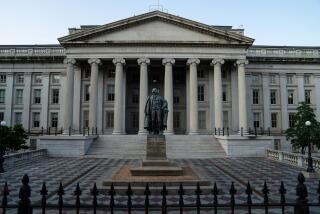Budget Office Director Predicts Government Deficit Until 2005
- Share via
WASHINGTON — In a resounding declaration that federal budget surpluses are gone for years to come, President Bush’s budget director said Wednesday that the recession and wartime expenses would force the government to run deficits at least until 2005.
Mitchell E. Daniels Jr., director of the Office of Management and Budget, said Wednesday that “a costly convergence of factors” had dramatically changed the fiscal outlook of the government, which less than a year ago was projecting surpluses as far as the eye could see.
“It is regrettably my conclusion that we are unlikely to return to balance in the federal accounts before fiscal ‘05,” Daniels said in a speech to the National Press Club. “Things will have to break right for us to do that.”
Daniels’ comments mark the first time that an administration official formally acknowledged that the budget would run in the red this year, although that has been widely expected. More sobering, Daniels’ comments dashed any hope that the economy will turn around quickly enough to bring surpluses back any time soon.
White House spokesman Ari Fleischer said Wednesday that the gloomy budget outlook was one reason why Bush wanted Congress to act quickly on the administration’s economic stimulus plan. And Daniels said the looming deficits also should restrain spending plans as Congress wraps up the year’s appropriations bills and Bush begins planning for the January release of his next budget request.
“The decisions just ahead of us, the decisions we will make between now and the end of this fiscal year, and particularly those we will make about the fiscal year to follow . . . will determine whether we ever see another surplus,” Daniels said.
The sobering assessment was a milestone in a remarkable transformation of the federal budget outlook over the last year. In the 2000 budget year, a record $237-billion surplus was recorded; last spring, analysts were projecting a decade of surpluses totaling $5.6 trillion.
Those surpluses began to fade first with passage of Bush’s $1.35-trillion, 10-year tax cut last May. They dwindled further as the economy slowed through the spring and summer. Then the World Trade Center was reduced to rubble on Sept. 11, dealing a devastating blow to the already weak economy. That drove Congress to pour billions into both the recovery effort and the nation’s response to the terrorist attack.
Although Daniels offered no firm estimate of what the 2002 deficit would be, budget analysts generally expect the red ink to run into the tens of billions.
More to Read
Get the L.A. Times Politics newsletter
Deeply reported insights into legislation, politics and policy from Sacramento, Washington and beyond. In your inbox twice per week.
You may occasionally receive promotional content from the Los Angeles Times.











